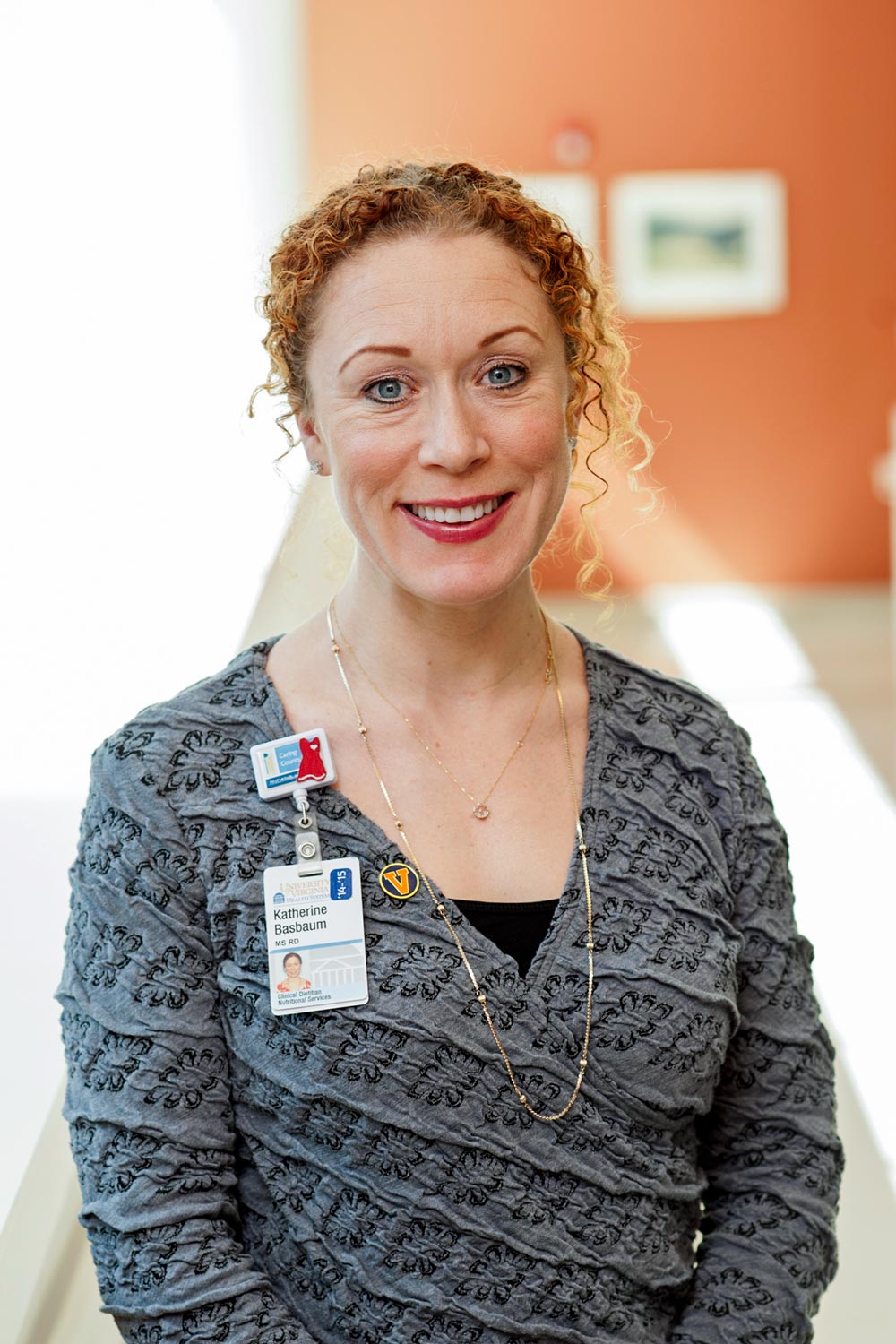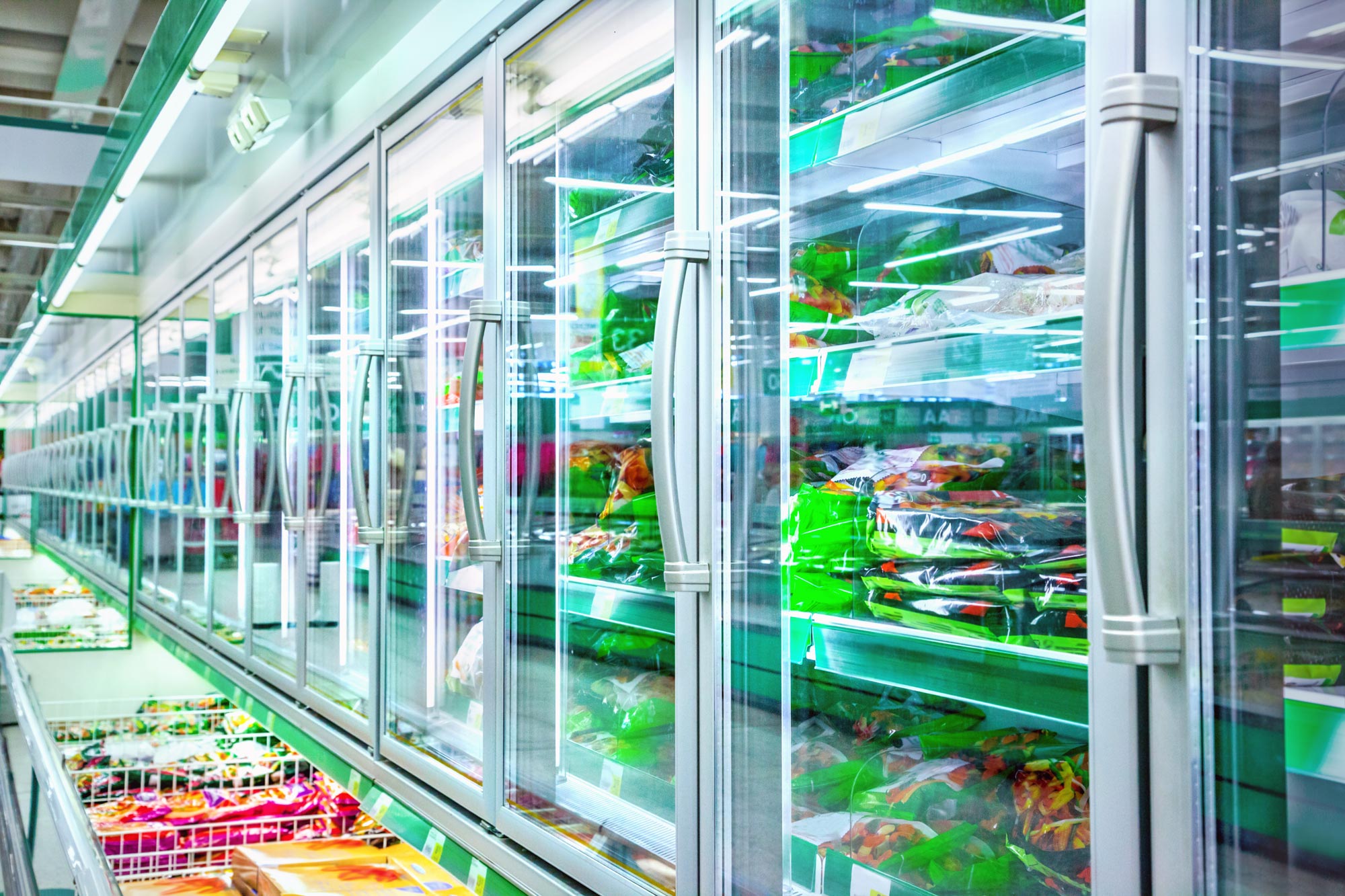Find the latest information on the University’s response to the coronavirus here.
Shopping has become navigation, and whom to do it better with than a registered dietitian?
Katherine Basbaum, a clinical dietitian at the UVA Health’s Heart and Vascular Center, is passionate about educating people on nutritional solutions to such health issues as heart disease, diabetes, obesity – and now, shopping and eating in the time of COVID-19.
Basbaum writes popular articles on healthy eating for blogs, websites and print publications, and serves as a nutrition expert for local TV stations. During graduate school at Tufts University, she enjoyed internships at Eating Well and Cooks Illustrated magazines, where she developed editorial content, analyzed recipes and performed nutrition research.
At UVA, she advocates for nutrition education as a speaker to the general community, student groups and other health care practitioners.
Here she discusses shopping and healthy eating during social distancing.
Q. What are your strategies for effective shopping?
A. There are definitely a lot of challenges to grocery shopping these days, with limited items available and the need to be swift and practice social distancing in narrow grocery aisles. I’ve got a few tips for navigating the grocery store during this “new normal.”

Basbaum photo. Caption: Katherine Basbaum, a clinical nutritionist, hopes that healthy home eating habits will develop and continue beyond the pandemic period.
Make a list of the staples you need. Whether it’s using an app on your phone or with pen and paper, this will save a lot of time, and help you get in and out quickly. In our house, we use an app where your lists can be shared with other people. So, we’ve both got access to the grocery list on our phones, we can both add items to the list, and when someone purchases an item and removes it from the list, the other person is notified.
Be flexible. Although the shelves of most stores are still pretty well-stocked, they may not have as many varieties of each product as before. The important thing is to get some wholesome staples into your pantry. I recently bought a different brand of coffee beans because my go-to brand was out. Coffee is a big deal in our house, so I was nervous that it’d be horrible, but it’s actually really good and the price was comparable.
Buy extra, but don’t go overboard. I used to go to the store at least once a week, if not more; now it’s more like once every two weeks. So even though it feels weird for me to buy two big bags of tortilla chips instead of one, or 10 cans of beans instead of three or four, it makes the most sense; I can always make a little more room in the pantry and it will keep me safer with fewer trips to the store.
Q. Because we want to minimize our time in the store, it seems best to rely on non-perishables. How can we continue to eat healthy while going to the store only rarely?
A. Non-perishables have gotten a bad rap over the years, which is a shame because there is a lot of nutritious, healthful food in the non-perishable food category. We’ve all heard the advice to “shop the perimeter” of the grocery store in order to find the healthiest foods. But what about the bags of brown rice, quinoa or whole grain pasta? Or the dried or canned beans, olive oils, vinegars, low-sodium stocks and broths or frozen vegetables? All these foods are located in the center aisles, and they are excellent choices for a shelf-stable, nutritious diet.
It’s also important to keep in mind that there are a lot of perishables, such as produce, that you can still enjoy even when shopping less often. For example, root vegetables – carrots, beets, onions, garlic, sweet potatoes and radishes – and fruits like apples, oranges, bananas and avocados are all foods that will keep for a bit, don’t have to be eaten within a couple days and will help keep you healthy.
Q. A lot of people are getting takeout. It’s quick, easy and convenient, but is it healthy to eat a lot of prepared foods?
A. Unfortunately not. Even though it is quick and convenient, the same rules apply when it comes to takeout or fast food – it’s usually loaded with salt, saturated fats and calories, so, if possible, limit the take-out to once or twice per week.
Q. What about people with underlying health conditions, such as heart disease and diabetes? How can they maintain specialized diets?
A. People with underlying health conditions like diabetes, heart disease or obesity may actually be better able to stick to their eating guidelines now than they were before the stay-at-home guidelines. One of the major pitfalls to sticking to a “diet” is easy access to junky, processed foods when we’re out and about all day.
Now that we are sheltered in place, cooking at home is more of a necessity than a choice. And when you cook from scratch, assuming that you are using minimally processed ingredients, you are almost guaranteed that the meals with be much lower in refined carbohydrates, calories and added sugars and sodium – all the things we want to focus on when trying to control diabetes, heart disease or weight.
Q. What kind of meals are you and your family enjoying at this time?
A. For a few years now, we’ve been enjoying one of the meal-kit services that delivers ingredients and recipes for three dinners per week and we are continuing with it during this time. It’s not for everyone, but it works for us.
Aside from that, as many are doing right now, we’re getting creative with beans. My husband recently cracked open an industrial-sized can of kidney beans from Costco and he made two completely different and delicious creations. The first was a healthy twist on baked beans and the second was bean salad with a light dressing of olive oil, apple cider vinegar and a ton of dried herbs.
Q. Do you think our eating habits and diets will change in the long term as a result of this time spent at home, cooking more?
A. It’s hard to say, but I hope so. There is a lot of research that shows the less we eat out, the healthier we are. Many of us may already know this and have been cooking most of our meals at home for a long time. But I know there are a lot of people – many of them are my patients – who used to think they didn’t have the time, or didn’t have the skills, or that home cooking wouldn’t be tasty or would cost too much.
Hopefully, folks who are new to the healthy home-cooking scene are finding that it’s actually doable and tasty and maybe even enjoyable, which in turn will result in new habits that will continue beyond our current situation.
Media Contact
Article Information
April 27, 2020
/content/qa-nutritionists-advice-healthy-shopping-and-eating-during-pandemic

